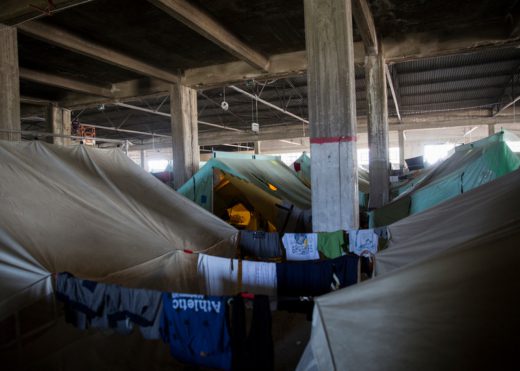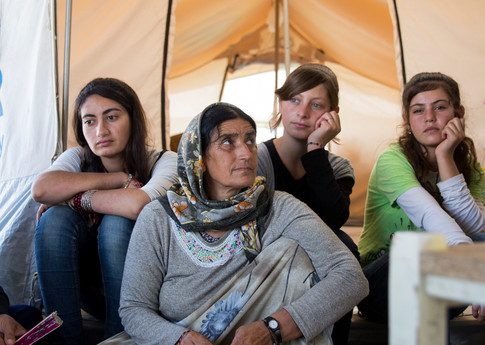In 2015, the global refugee crisis moved centre stage in Europe as never before.
Uprooted by persecution and conflicts old and new, hundreds of thousands of men, women and children looked to Europe as a place of safety.
One year on – following the sealing of successive borders – images of thousands of people trudging through the Balkans have stopped. But the humanitarian crisis has not. Almost 60,000 refugees and migrants are stranded in Greece, the majority in appalling conditions.
The result is immense and avoidable suffering.
We were living on our hope, but now our hope is broken.
Kurtey from Iraq
TRAPPED IN GREECE

Warehousing refugees
More than 47,000 refugees and migrants are stranded in mainland Greece, including young children, elderly people, people with serious health problems or disabilities and pregnant women.
They live in appalling conditions, sleeping on floors for months on end. For many, profound insecurity is a constant factor in their daily lives, even down to getting adequate food.
A further 13,100 people arrived on the Greek islands after the implementation of the EU-Turkey migration agreement in March 2016. They are stuck in overcrowded camps, living in dreadful conditions while they wait for decisions on their asylum applications.

There is no effective system to identify vulnerable individuals such as pregnant women, elderly people, victims of torture, people with disabilities, or unaccompanied children, and many are not being provided with the specialized services they need, putting them at heightened risk.
Appalling conditions and uncertainty over the future are fuelling tensions that have erupted into violence in a number of camps. Safety is a particular concern for women and girls, with poor lighting, a lack of safe separate toilets and showers and the absence of mechanisms to report harassment or protect victims.
DOWNLOAD “OUR HOPE IS BROKEN”

Recommendations
European governments must swiftly implement the following measures:
- Increase the number of pledged relocation places in line with current needs in Greece, accept relocation requests and widen the scope of the programme to include all asylum-seekers.
- Establish accessible, public and fast-tracked family reunification procedures to ensure the swift reunion of family members stranded in Greece with close relatives in other European countries.
- Grant access, for example, through humanitarian visas for asylum-seekers in immediate need of special care.

The need to improve the asylum and reception system in Greece – and ensure access to effective protection – is a task that falls to the Greek authorities.
- Greece must urgently provide suitable accommodation with the support of the EU. This includes medical and specialist care when required, separate sanitary facilities for men and women and ensuring the safety and security of refugees, with effective access to justice.
DOWNLOAD “OUR HOPE IS BROKEN”
Relocation pledges unfulfilled

Show solidarity with refugees
These people’s suffering – and resilience – have inspired thousands of people in Greece and elsewhere. People across the continent have opened their arms, even their homes, and have shown solidarity with some of the world’s most vulnerable people.
During Amnesty International’s visit to Greece in July 2016 we met Alan and Gyan, Basel and a group of Yezidi women called Kurtey, Ghazal, Karmey, Beshey and Noorey.
Read their stories and send a message of support by email.
Amnesty will deliver these messages to Greece to let them know that people around the world are with them, saying “I welcome refugees”.

Alan and Gyan’s story
“I want to say to the European people that want to welcome refugees, thank you…”
30-year-old Alan and his sister Gyan (28) are Kurds from Syria. They both have a muscle-wasting condition and are wheelchair users.
Journeying on horseback over the mountains to Turkey, they arrived in Greece in 2016 with their mother and two other siblings hoping to make it to Germany – where their father and a younger sister had arrived in 2015. But by then the northern border with Macedonia was effectively closed to refugees.
Alan told us, “no disabled, no pregnant women… no one could cross. All my dreams were broken in that moment.”

Basel’s story
Basel Tabarnen a barber from Syria, was living at the Nea Kavala camp in northern Greece until October/November.
He is 45 years old and has two sons and four daughters. The youngest, pictured here, was just 11 days old and was born in the camp. He wants to be relocated to Sweden where his daughter lives.
“It is very bad life. We are human, we cannot live as animals. I’m a human being, I have feelings.” – Basel
Basel moved to Athens in October/November because it was too cold for his family to stay in the camp. He had to hold his baby in his hands to keep her warm. He managed to save some money from working as a barber in the camp and they are staying in an apartment.

The Yezidi Sisterhood
Kurtey, Ghazal, Karmey, Beshey and Noorey were forced to leave Iraq in August 2014 when IS swept across the north of the country, in a systematic campaign of ethnic cleansing.
They felt unsafe in Nea Kavala camp and formed a protection circle to look after each other. “We don’t use the showers; we have built a Hammam next to our tents”.
They have since moved to another camp, but they had a clear message for European governments:
“We want our voices to be heard…Get us out of Greece.”

